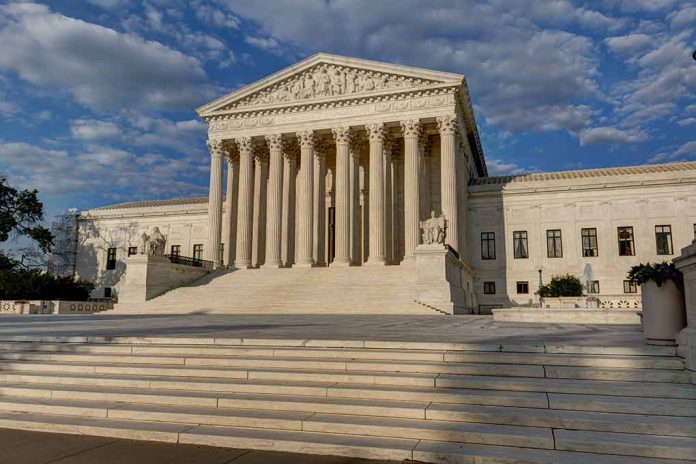
The Supreme Court has overturned the murder conviction of Jared Holton Seavey, citing problems with expert testimonies in his Texas trial.
At a Glance
- Seavey’s conviction was overturned due to a violation of the Sixth Amendment’s Confrontation Clause.
- Dr. Fries testified instead of the autopsy’s original expert, Dr. Roe, sparking constitutional debate.
- The Supreme Court’s decision relied heavily on the precedents set by Smith v. Arizona.
- The case is now remanded, with potential for further legal proceedings or a retrial.
Supreme Court’s Ruling
The U.S. Supreme Court’s recent decision focuses on the essential right of defendants to confront witnesses against them, a fundamental principle grounded in the Sixth Amendment. In Seavey’s original trial, Dr. Richard Fries provided expert testimony despite not conducting the autopsy. This led to serious concerns that Seavey was denied his constitutional right to challenge Dr. Fries’ testimony effectively.
Smith v. Arizona has set the tone for Seavey’s case, reinforcing the necessity for cross-examination where expert testimonies substitute primary witnesses. The Court emphasized that Seavey faced a disadvantage without the original expert’s testimony, an issue similar to that addressed in Smith v. Arizona, requiring the witness to testify live.
Legal Precedents and Implications
Seavey’s case highlights growing shifts in judicial procedures impacting defendant rights. In particular, the court’s veer towards allowing testimonies reliant on secondary analysis without the chance for cross-examination underscores significant legal debates. Texas jurisdiction, through the Court of Appeals, initially held Fries’ testimony as sufficient. Yet, the Supreme Court saw this reliance as a breach of constitutional protections.
Despite the Court of Appeals maintaining the stance that Fries “acted as more than a mere surrogate for Dr. Roe’s autopsy report,” the Supreme Court determined a new trial is appropriate, ensuring Seavey’s constitutional rights are honored. This is a clear directive that preserving defendant rights remains paramount.
Next Steps for Seavey’s Case
With the ruling now in place, attention turns to the 14th District of the Texas Court of Appeals, where Seavey’s fate will be reassessed. Potential for a retrial looms, depending on how the court integrates the Supreme Court’s guidance into this complex situation. The significance of precedents like Smith v. Arizona will be instrumental in dictating procedural propriety.
The broader implications of this ruling remain to be seen, potentially influencing how courts nationwide address the Confrontation Clause and its application to expert testimonies. Legal reform and the enforcement of established rights will be central to ensuing discussions as Seavey’s case continues to evolve in this judicial landscape.













